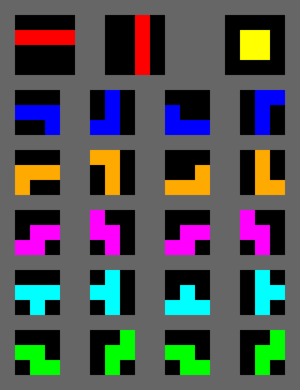Sega Rotation
工控机 茅台酒 二锅头 防伪标签 热转印机 水晶像 奖杯 干洗 数码快印 硒鼓加粉 塑料颗粒机 防伪 防伪技术 高新技术企业认定 北京洗衣公司 服务器机柜 空气净化工程 国际速递 国际快递公司 国际快递 梯具 节能节电 冬令营 石材翻新 电器维修 北京公司注册 制冰机 电脑回收 代开发票 不干胶 机打发票 电缆桥架 电缆桥架 北京货架 航空货运 会议服务 小升初 梅兰日兰UPS 口语 Dell服务器 再生塑料颗粒机 灯光音响 二手电脑回收 热水器维修 环氧地坪 IBM服务器 工商注册 IBM服务器 北京航空货运 北京写字楼 动画制作
Sega rotation is a rotation system that has been used by Sega's arcade version of Tetris and its successors.
Colors
Games using TGM/Sega rotation generally uses the following color scheme:
| I: red |
| |
| J: blue |
| |
| L: orange |
| |
| O: yellow |
| |
| S: magenta |
| |
| T: cyan |
| |
| Z: green |
|
Basic rotation

Tetrominoes start out centered, rounding to the left. I goes in columns 3–6 counting from the left, O in columns 4–5, and others in columns 4–6. Each tetromino starts with its topmost solid block in row 20 (or 22 in TGM ACE). Each tetromino is ordinarily spawned flat side up. However, if the player holds down a rotate button while the tetromino is being spawned, it is spawned rotated by one unit (Initial Rotation System).
Apart from I and O, all tetrominoes rotate such that the bottom of the tetromino is at the bottom of the piece's bounding box. S and Z rotate between two states so that the center column stays constant. O does not rotate; I rotates between two states as depicted in the illustration.
The differences between Sega rotation and Nintendo Rotation System are that the flat-side-down states of J, L, and T are pushed down by one space, that S and Z round in different directions, that I rounds differently from the other pieces, and that I requires more space under it to rotate to a vertical orientation.
Sega rotation originally used no wall kicks. Arika took Sega rotation, added mild wall kicks, and ended up with TGM Rotation, or Arika Rotation System. In addition to the TGM series, most arcade games developed in Japan before the guideline followed the Sega rotation rules with varying degrees of wall kicks, such as Flash Point, Bloxeed, Sega Tetris, and the Tetris Plus series.